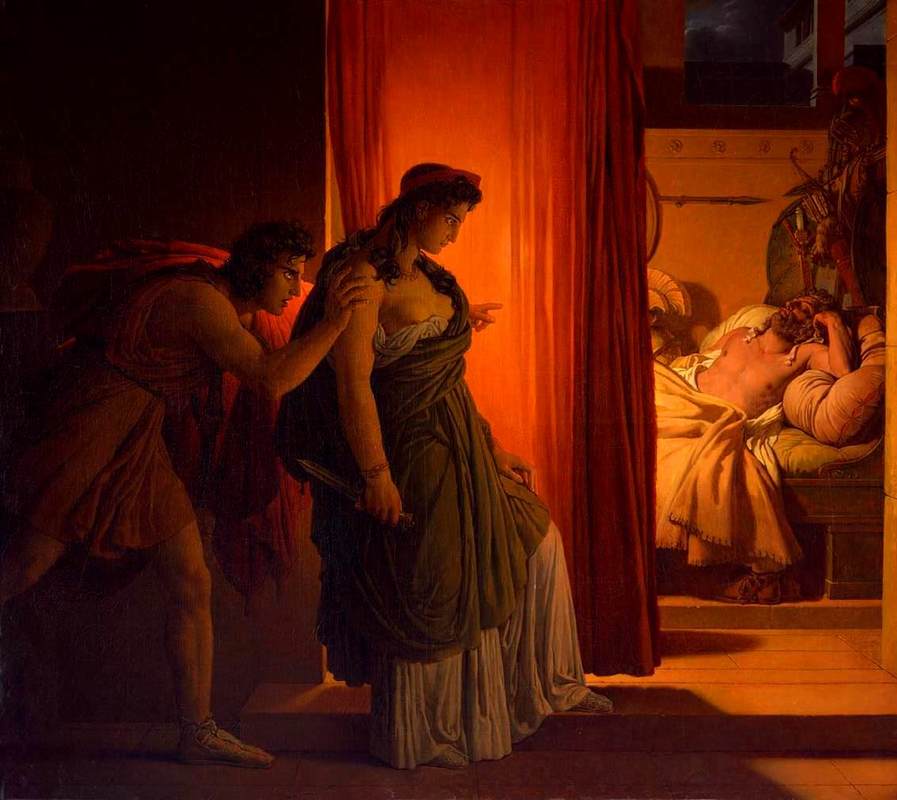
Monday
People hear in a story what they want to hear. That’s what my student Rin Carroll discovered when she compared the different versions of the Agamemnon-Clytemnestra-Orestes story that appear in The Odyssey. Of the five different characters who recount the tale, each has a different take.
The Agamemnon story is important, Rin noted, because it works as a foil to Odysseus’s story. He too could suffer Agamemnon’s fate if Penelope were to be unfaithful and a lover murderous. Warriors absent for long periods may well have suffered such anxieties. Odysseus allays their fears with its happy ending.
In the first book, law-and-order Zeus alludes to Agamemnon’s murder. In his eyes, Aegisthus has ignored heavenly instruction, conveyed through messenger-of-the-god Hermes, “not to murder Agamemnon or court his wife.” As a result, divine justice is administered:
Aegesthus would not hear that good advice.
But now his death has paid all debts.
(trans. Emily Wilson)
Agamemnon’s marital relations don’t show up in Zeus’s account. That would be Hera’s domain.
Zeus’s observations prompt Athena to point out that Odysseus cannot fulfill his own divinely-mandated duties because he is stuck on Calypso’s island. Zeus consequently instructs Hermes to tell the island enchantress to let Odysseus go. Seen psychologically, Odysseus—unlike Aegesthus—hears the inner call of duty. He launches out upon the uncertain sea to fulfill it.
We next hear of Agamemnon when Athena, taking the form of the wise counselor Mentes, talks with Telemachus. Here, however, the emphasis is all on Orestes—which makes sense, since Mentes is urging Telemachus to step into manhood:
You must not stick to childhood;
you are no longer just a little boy.
You surely heard how everybody praised
Orestes when he killed the man who killed
his famous father--devious Aegisthus.
As Rin points out, Mentes/Athena doesn’t mention Orestes killing his mother since that part of the story doesn’t match up. Unlike Clytemnestra, Penelope remains faithful.
When he travels to see Nestor and Menelaus, Telemachus hears the Agamemnon story two more times. Nestor, like Mentes, is interested in seeing Telemachus grow up and so also focuses on Orestes:
How fortunate the dead man [Agamemnon]
had left a son to take revenge upon
the wicked, scheming killer, that Aegisthus,
who killed Orestes’ father. My dear boy,
I see that you are tall and strong. Be brave,
so you will be remembered
Telemachus acknowledges the parallel:
Your majesty,
King Nestor, yes. Orestes took revenge.
The Greeks will make him famous through the world
and into future times. I wish the gods
would grant me that much power against those men
who threaten and insult me—those cruel suitors!
Rin notes that Menelaus, by contrast, is far more focused on the pathos of the act. He describes Agamemnon’s joy of stepping foot in his country–he “touched and kissed the earth of his dear home” and “wept hot floods of tears, from happiness”–and the tells how Aegisthus, tipped off by his spy, springs his trap. Military-minded as he is, Menelaus mentions the battle and how many were killed. Clytemnestra is never mentioned.
She takes center stage in Agamemnon’s account, told to Odysseus in the underworld. (Aegisthus, meanwhile, barely shows up.) It makes sense that this would be a husband’s major focus. Agamemnon also mentions Cassandra, whom he has brought home to be his mistress and who is absent from the other accounts:
I heard the desperate voice
of Priam’s daughter, poor Cassandra, whom
deceitful Clytemnestra killed beside me.
As I lay dying, struck through by the sword,
I tried to lift my arms up from the ground.
That she-dog turned away. I went to Hades.
She did not even shut my eyes or close
my mouth. There is no more disgusting act
than when a wife betrays a man like that.
That woman formed a plot to murder me!
Her husband! When I got back home, I thought
I would be welcomed, at least by my slaves
and children. She has such an evil mind
that she has poured down shame on her own head
and on all other women, even good ones.
As I interpret the underworld scene, it is Odysseus’s internal struggle about whether to stay with Circe or to head home. Agamemnon’s fate argues for the first option, but the king then reassures Odysseus:
But your wife
will not kill you, Odysseus. The wise
Penelope is much too sensible
to do such things.
Despite such faith, Odysseus will take one piece of Agamemnon’s advice when he returns home, hiding his identity from Penelope until after he has killed the suitors. Agamemnon has advised,
So you must never treat your wife too well.
Do not let her know everything you know.
Tell her some things, hide others.
We see Agamemnon one last time in the last book when the suitors stream into Hades, his reappearance accentuating the contrast between the two stories. Once again, Agamemnon is focused on wives, never once mentioning Aegisthus or Orestes:
Lucky you,
cunning Odysseus: you got yourself
a wife of virtue—great Penelope.
How principled she was…
Just as different characters in The Odyssey take away what they need from the story, so Homer’s readers have been doing so with The Odyssey itself. I’ve written how Sophocles and Euripides have a mostly negative view of Odysseus, as has Dante, while Tennyson is ambivalent (but leaning positive). Nikos Kazantzakis and C.P. Cavafy are positive, Margaret Atwood is ambivalent (but leaning negative), and my students are all over the map. One writes that Odysseus is “a jerk,” one is put off by his lying, one regards him as an oppressive patriarch, one likes how he works in concert with his wife, one is impressed that he resists going over to the dark side.
And so a rich story is interpreted and reinterpreted countless times, with each reader and each generation of readers focusing on the themes that serve them. The works are constantly renewed in the process.